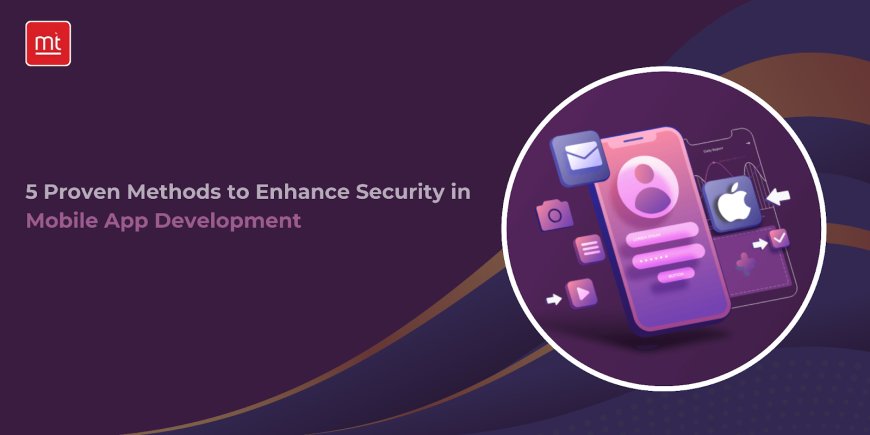5 Proven Methods to Enhance Security in Mobile App Development
Mobile applications have evolved from optional tools to daily essentials, bringing security to the forefront of app development. As mobile apps collect sensitive user data, it becomes critical to implement best practices that protect against data breaches, identity theft, and compliance violations. This blog outlines five essential strategies for securing mobile apps—from secure coding and API protection to robust authentication, encryption, and continuous security testing. Learn how developers can stay ahead of threats and build trust through secure development.

Smartphones and tablet applications are not tools anymore, but rather necessities. From placing an order, to paying friends for some cash, to monitoring your biometrics, applications have become an item of daily use. The necessity of this dependency brings about one major issue, which is security.
The global mobile application market size was valued at USD 252.89 billion in 2023 and is projected to grow at a CAGR of 14.3% from 2024 to 2030. The use of mobile apps means that a good amount of personal, financial and even behavioral data are within reach. Any opportunity could be exploited with consequent penetration, legal issues or erosion of users’ confidence.
By 2025, the level of mobile application protection is much higher than it is today. Users demand protection. Regulators demand compliance. And developers? You’re on the front lines.
But here's the good news: securing your mobile app isn't an impossible task. With a thoughtful approach and proven strategies, you can build apps that aren’t just functional but also resilient to attacks.
Let’s dive into five proven methods to enhance security in mobile app development.
5 Effective Ways to Improve Security in Mobile App Development
-
Secure Your Code from the Ground Up
Security vulnerabilities are introduced right where developers create software –in the source code. No matter if you are making native iOS or Android applications or creating applications using cross-platform frameworks, like React Native or Flutter, your code is your first barrier.
Most developers embed vulnerabilities that make the control code exposed to reverse engineering, code injection or data leakage. This is particularly per=media because as soon as the application gets to the user’s hand, the code is also all his.
Application packages are easily decompiled for hackers thanks to tools like APKTool or JD-GUI. If your code is not obfuscated or encrypted appropriately, it’s like giving somebody the keys to your house.
Secure coding isn’t a one-off task; it’s a mindset. Embed it into every stage of your development cycle.
-
Implement Robust Authentication and Authorization
Before intimacy is possible, identification is accomplished by authentication, which recognizes who the user is. Granting is the concept which adds an approval, or an endorsement on what the user is capable of doing.
Any of these processes that are weaker put your ‘app’ in the deep end because it’s susceptible to identity theft, privilege escalation, as well as data theft. Current users do not anticipate entering usernames and passwords alone anymore. And frankly, it’s not enough for mobile app development agency.
Start with multi-factor authentication (MFA). The extra layer in the form of fingerprint, SMS code, or an authenticator app makes it significantly difficult for an unauthorized person to get in. For higher risk Apps Biometric Authentication’ becomes standard like touch ID for banking & health related Apps.
-
Encrypt Everything—Not Just the Obvious
Encryption should be seen as the very protective shield around the information about the users of a website or an app. Otherwise, all the information, including passwords, messages, and calls, is exposed in plain sight. Most of the developers are aware of encrypting data while in transfer (TLS/SSL), what about data that is idle but stored in the device?
Handling personal data including the health records or payment information local storage is typically used for android app development services. Nevertheless, any data stored in SharedPreferences (Android), NSUserDefaults (iOS), SQLite as local databases or custom recordings can be decrypted with root/jailbreak. This is why full-disk encryption and app-level encryption should be implemented as standard.
-
Secure Your APIs Like Fort Knox
Behind every good mobile app is a powerful API. It’s how your app communicates with your backend, syncs user data, authenticates sessions, and more. But APIs are also a massive attack surface.
Insecure APIs are responsible for a significant chunk of mobile app breaches. Exposed endpoints, weak authentication, and data overexposure can turn your android app development services into an open invitation for hackers.
Start with token-based authentication like OAuth 2.0. Never let your APIs rely on session IDs or IP addresses alone. Tokens should be short-lived, scoped, and refreshable. Always check the origin of the request and verify its authenticity.
-
Stay Vigilant with Continuous Testing and Monitoring
Security isn’t a feature you build once—it’s a living, breathing discipline. Threats evolve, attack vectors change, and your app must keep pace when you hire iOS app developers.
This is where continuous testing and monitoring comes in. Start by integrating security testing into your CI/CD pipeline. Static Application Security Testing (SAST) helps catch issues early in the code. Dynamic Application Security Testing (DAST) simulates real-world attacks to evaluate app behavior.
Tools like SonarQube, Checkmarx, and Fortify offer both static and dynamic testing capabilities. Don’t forget mobile-specific testing frameworks. Tools like MobSF (Mobile Security Framework) can scan your APK/IPA files for vulnerabilities, insecure configurations, and hardcoded secrets.
Conclusion
Mobile app security isn’t a checkbox—it’s a continuous commitment. In an era where apps are collecting more data than ever, your responsibility as a developer or business owner is to protect it with everything you’ve got.
Mobile users trust your app with their personal lives. Don’t let them down and hire mobile app developers. Implementing these practices isn’t just about preventing breaches—it’s about building trust, complying with regulations, and future-proofing your digital brand. The time to secure your app isn’t tomorrow. It’s now.
If you’re looking for a partner who understands the intricacies of secure cross platform mobile app development, ManekTech is here to help. With years of experience in building robust, user-centric, and secure applications, ManekTech offers end-to-end mobile app solutions tailored to your business needs.
What's Your Reaction?
 Like
0
Like
0
 Dislike
0
Dislike
0
 Love
0
Love
0
 Funny
0
Funny
0
 Angry
0
Angry
0
 Sad
0
Sad
0
 Wow
0
Wow
0






































